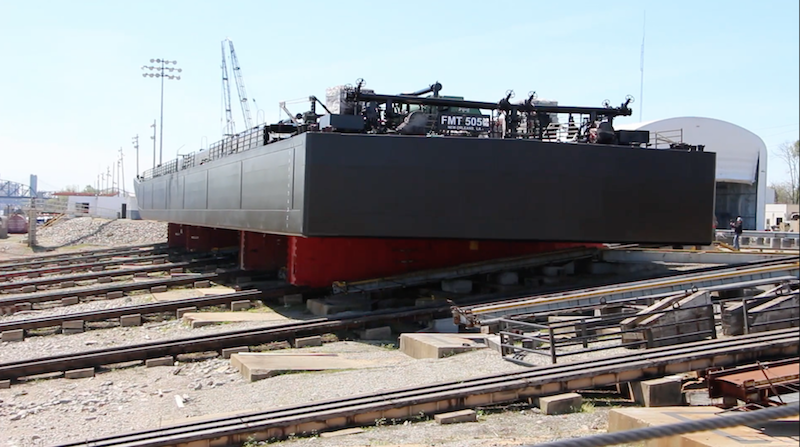Twice since November barge builder Jeffboat LLC warned of upcoming layoffs, each time saying it had no plans to shut down. But by March the dramatic drop in demand led parent American Commercial Lines (ACL) to announce the closing of the oldest and largest inland shipyard in the U.S.
Jeffboat’s history dates back to 1834 with the founding of riverboat builder Howard Shipyard. During World War II, the yard built ships for the Navy. After the war, Jeffboat focused on barges and towboats. Located on 80 acres on the Ohio River in Jeffersonville, Ind., the yard’s five production lines once employed over 800 workers and could launch one dry hopper barge every 16 hours, one 10,000-bbl. tank barge every three days, and one 30,000-bbl. tank barge every five days. In late April, Jeffboat launched its 12,917th and final vessel.
Industry orders peaked about five years ago, fueled by low steel prices and favorable investment terms. Then coal shipments fell significantly and the energy downturn set in. Reaching equilibrium could take quite a while. Well-built and maintained barges can last 20 to 30 years or longer.
Other barge builders have been affected. Jeffboat’s major rival, Trinity Industries, has pared its plants and is planning a spinoff of its barge manufacturing and other businesses. Heartland Fabrication (formerly Brownsville Marine Products), which built its first barge in 2006, is diversifying.
“They (Jeffboat) made a very painful but very logical decision,” said Brent Dibner, a maritime industry consultant at Dibner Maritime Associates, Chestnut Hill, Mass. “I don’t think they did anything wrong.”

A banner on the last barge launched at Jeffboat was a tribute to the Indiana shipyard's workers. Teamsters Local 89 photo.
The fleet has been in the same size range for a decade or more. “The result is simple math. Coatings are better, carriers are fewer, the grain trade is a gentle trade, and coal has very substantially declined” in both tonnage and ton-miles. And coal “was where you took your slightly battered covered barges.”
“In theory, if you take away supply you improve utilization, which should improve rates,” Dibner said. They can hope this will tighten demand, raise prices slightly and reduce overbuilding. “Higher prices at least cause people to think twice.”
There also is some hope that increased coal exports will make up for a 30% drop in domestic shipments since 2011 that was fueled by coal-fired power plant closings or conversions to natural gas. The U.S. exported 97 million short tons of coal in 2017 — most of it steam coal — a 61% increase from 2016, according to the U.S. Energy Information Administration.
Recent weather extremes from low water to ice and floods meant delays, traffic congestion and more towboats with fewer barges. Grain tonnage through late April on the Mississippi, Ohio and Arkansas rivers was 14% lower than the three-year average, U.S. Department of Agriculture figures show. And uncertainty over trade with China persists.
BARGE NEWBUILDS DOWN
Jumbo hopper barge deliveries last year fell by 71.6% from 976 in 2016 to 277, River Transport News reported. “The diminutive newbuild numbers last year were more than offset by barge scrapping activity,” RTN said. Tank barge deliveries to inland operators fell for the third straight year to 85 in 2017 down from 112 in 2016.
In 2017 Jeffboat built 91 barges — 27 covered hoppers, 47 open hoppers, two 10,000-bbl. tank, nine 30,000-bbl. clean, and six 30,000-bbl. hot oil barges.
“We had to build the equivalent of 250 hopper barges a year and employ 600-800” to be financially rewarding, said Mark Knoy, ACL president and CEO. Up until last year, that’s what they were doing, “and we had been building at a profit.”
Over time, “you saw cheap steel, cheap money and the unintended consequences of accelerated depreciation. At the same time, we had demand leaving the river,” primarily coal, he said. By the time the market caught up, barges were already built.
Since Knoy arrived in 2011, Jeffboat has been the principal supplier of ACL’s barges. “We have built at other yards, too,” he said. “I think you will see us ordering barges on a regular basis. Prices will be subject to demand.”
As for the future of Jeffboat’s property and equipment, Knoy said, “We’ve got all kinds of inquiries,” but no firm plans as of mid-May.
“There’s a lot of interest mostly from developers who want to use the land in other ways,” said Jeffersonville Mayor Mike Moore. Jeffboat could give the land to the city, “and you get a pretty nice tax write-off, and the city is willing to accept the responsibility of cleaning the site,” said Moore, who expects to discuss the issue with ACL.
The May shutdown affected 207 employees. “For me this is heartbreaking news that the boatyard will be closing,” Jeff Cooper, business agent and recording secretary for Teamsters Local 89 and a former Jeffboat worker, said in a notice on the union’s site. He met a lot of great people, who “work extremely hard at building a great big-ass American-made product the old-fashioned way like no other, and it was always built under the union label with extreme pride.” Union officials could not be reached for further comment.
Moody’s downgraded ACL’s debt in April with a negative outlook due to a high debt burden and prolonged weakness in both liquid and dry markets. “A meaningful recovery seems unlikely in the near term amid freight rate pressures that will continue to weigh on earnings from persistent supply-demand imbalances,” said the rating agency, which estimates ACL’s revenue at $1 billion for the year ended Dec. 31, 2017.
Platinum Equity acquired ACL, which has 4,200 barges and 150 boats, in December 2010 in a $777 million deal that took the company private. Historically, ACL was one of Jeffboat’s most significant customers, the company said in filings before going private. In November 2015, ACL acquired AEP River Operations from American Electric Power for $550 million.
Jeffboat and Dallas-based Trinity each had about 40% to 45% of the market with the rest going to Heartland and others, said Ken Eriksen, senior vice president, Informa Economics Inc., Memphis, Tenn.
Almost 900 covered barges were added to the fleet in 2016, he said. The last time there was that large an addition was 1997 with 1,200. Six hundred were added yearly between 2008 and 2012. “People got some good deals. They wanted some replacements,” Eriksen said. “It’s going to take at least three years before we start to see sizable retirements. It’s a good fleet.”
Campbell Transportation Co. Inc. last year bought 155 barges and four towboats from ACL being “very careful not to contribute to the problem,” CEO Peter Stephaich told WorkBoat at the time, noting that the barges were already working in the inland market. He doesn’t regret buying quality used equipment at the right price, “and we didn’t take on a lot of debt.” Stephaich estimates there are about 1,000 excess barges in the system.
Houston, Pa.-based Campbell, which owns and manages more than 1,100 barges and 50 towboats, also has diversified its services away from coal and gotten into the grain and liquid markets. The company has moved into new geographic areas, provides crane and construction services, and offers consulting and compliance services for Subchapter M.
TRINITY TO SPIN OFF BARGE GROUP
Trinity is making a strategic move this year to spin off its infrastructure related businesses — including the inland barge group — into a public company, Arcosa Inc. Trinity will continue to operate its integrated rail manufacturing, leasing, and services businesses. The spin off should be completed in the fourth quarter. Barge and railcar production has been suffering since the second half of 2015, company filings said. Inland barge revenue fell 76% from $652.9 million in 2015 to $157.9 million last year. But they see “potential early signs” of a recovery.
At the end of 2008, Trinity reported a barge order backlog of $527.8 million. It hit a high of $564.1 million in 2012, but fell to only $98.2 million by the end of 2017, regulatory filings show. For the first quarter, the backlog was $124.5 million with liquid inquiries “encouraging,” company officials told analysts.
“We have no comment on the impact of Jeffboat’s decision to stop building barges,” said Trinity spokesman Jack Todd, adding that they produce barges in Caruthersville, Mo. and Ashland City, Tenn. He wouldn’t say whether they’re interested in Jeffboat’s facilities.
However, Eriksen said he expects Trinity to purchase much of Jeffboat’s equipment.
Trinity shut down its Madisonville, La., yard, which had 336 workers, in 2015, and Brusly, La., with its 288 workers, in 2016.
“It’s a terrible thing for the people of Jeffboat, the loss of an industry institution,” said Brian Mueller, CEO of Heartland Barge Management LLC, Columbia, Ill., which owns and manages more than 600 hopper barges and owns Heartland Fabrication in Brownsville, Pa. Taking a production company offline “is probably a good thing to get the fleet back into balance. It will probably help to strengthen both Trinity’s and Heartland’s positions.”
“It’s probably good for the industry,” said Stephaich of Campbell Transportation. “It keeps barge capacity from increasing quickly.”
Heartland is diversifying and next year plans to start offering 10,000-bbl. tank barges as well as other large heavy steel fabrication work outside the marine industry such as bridge beams and columns.
“There’s a significant turndown now in commercial marine industrial,” said David W. Evanczyk, CEO of Marine Builders Inc., Jeffersonville, a family-owned towboat, passenger vessel and repair yard located near Jeffboat. “We’re a smaller company, and we’re moving in other directions.” They’re getting back into pedestrian bridge construction and steel fabrication, and they expect repair work generated by Subchapter M.
Last year, Parker Towing, Tuscaloosa, Ala., took delivery of 35 jumbo hopper barges from Jeffboat. The company now has 310 hopper and four tank barges in its fleet. “We certainly hate to see them go. They’ve been a great supplier in the past,” said Charles Haun, vice chairman and CEO. “It certainly limits the companies in barge building and boatbuilding for the inland towing industry.”
He’s seen a number of cycles in his 43 years in the business, and yards have closed “but nothing as big as Jeffboat.”
“We have been through some tough times before,” Haun said. So, how long before the industry is back in balance? “I’m just beginning to try to figure that out. We’re talking about years, not months.”
Senior editor Ken Hocke contributed to this report.




